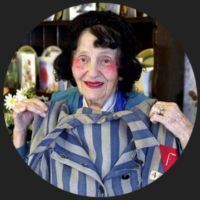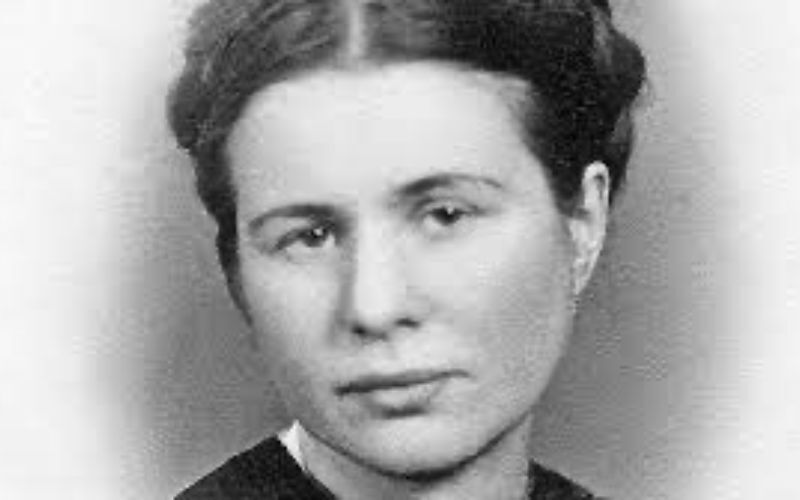Andrée Marthe Virot Peel

Born in France in 1905, Andrée Marthe Virot was running a beauty salon in the port city of Brest when the Nazis invaded in 1940. She joined the Resistance, initially distributing clandestine newspapers. Under the code name Agent Rose, she helped over 100 British and American pilots escape from Nazi-occupied territory onto submarines and gunboats, and also guided Allied planes to secret landing strips.
Her first act of defiance took place as German troops entered her town of Brest, when she gave shelter to a group of fleeing French soldiers and begged her neighbours for civilian clothes for them so they would not be captured.
When General de Gaulle declared in his famous broadcast of June 18 1940 that "France has lost a battle, but she has not lost the war," Andrée and some friends got together to type out the message and slip copies through people's letterboxes. At this point she became more involved in the Resistance, circulating the organization's ewspaper. Within weeks she was made head of an under-section of the organisation, responsible for sending information to the Allies.
During the war, Brest was an important naval base, and information about shipping movements was vital to the Allied war effort. By establishing contacts in the dockyard, Andrée was able to pass on information about naval installations, as well as about troop movements and the results of Allied aerial attacks.
These were mainly directed at the harbor area, but many bombs missed their target and fell on the town. No one blamed the Allies. She recalled one man whose house had been destroyed leaping with joy when he found that his precious radio, on which he listened to the BBC, had survived intact. On another occasion she came across a group of teenage boys singing "What joy, Tommy, now that we are united at last" to a well known tune, as British bombs rained all around.
Andrée Marthe Virot was born on February 3 1905 into a religious and deeply patriotic French family. Her father was a civil engineer who specialised in building bridges. When she returned to a devastated Brest after the war, she learned that he had been killed after walking too close to a German soldier who was fishing using hand grenades. A brother had also lost his life in Germany while fighting in the ranks of the Free French.
Andrée left Brest and returned to Paris where she became the manager of La Caravelle, a restaurant near the Luxembourg Gardens specialising in "first class cuisine at acceptable prices." News that she was a former Resistance worker attracted many clients including leading politicians and former Allied servicemen.
One day a young English student called John Peel came into the restaurant. He was supposed to be learning French, but his accent was so comical that Andrée offered to give him lessons. Though he was 20 years her junior, a relationship developed, and they ended up getting married. Her husband made his career as a neuropsychologist at Barrow Gurney mental hospital in Bristol and they settled in a village nearby.
The Work of the Resistance
The work Andrée assumed was extremely dangerous. Any family found harboring an Allied airman risked being shot and in 1943 Andrée herself was forced to leave Brest after a comrade (who had been forced to watch his family being tortured by the Gestapo) informed on her.
She fled to Paris and assumed another identity, but a week after D-Day she was again betrayed by a comrade, who confessed under torture. She was arrested and taken to Gestapo headquarters where she was stripped naked, interrogated and subjected to a series of tortures, including simulated drowning and being savagely beaten around the throat. As a result her gullet was displaced and her tonsils crushed. She continued to suffer pain for the rest of her life.
Ravensbrück Camp
Eventually she and other prisoners were transported to the women's concentration camp at Ravensbrück where, on arrival, they were forced to strip and frogmarched into what she later realised was a gas chamber. She never discovered why they were released since many others lost their lives. She noticed later that the camp did a brisk trade with local farmers who bought the ashes from the camp crematorium to spread on their fields.
Andrée narrowly escaped death on several more occasions. She fell ill with what a doctor told her was meningitis, but recovered. Then, during the daily roll call, she was selected for the gas chamber but was saved by a Polish fellow inmate who crept up to a table and snatched up the piece of paper with Andrée's number on it without being seen by the SS.
Eventually she was transferred to Buchenwald concentration camp where life seemed easier, initially at least, and she was able to send messages to her family in Brest via French prisoners-of-war working in the fields outside. But, as the Allies closed in towards the end of April 1945, it became obvious that the Nazis were determined to obliterate evidence of their crimes. By the time she and a group of fellow prisoners were lined up against a wall, they had heard that some prisoners had been shot and others killed with flame throwers, so they had little doubt what was in store.
As a firing squad drew near, she wrote later, the terrified prisoners heard a telephone ringing in the camp commandant's office. It was a message from the Americans to the effect that the firing squad had been seen entering the camp and that if they wanted to live, they would spare the lives of the prisoners. The soldiers fled.
Mrs. Peel Speaks of the War
Mrs Peel who says she was 'too old' to have children by the time the war had ended, said: "The war is a time I will never forget. I don't think anybody who lived during that period ever really can, but I lived a different life to many women as I fought like a man. There weren't many women in the sort of role which I had. In my house in Brest I used to hide the British and help them with their orders. I'd also tell them what they should be doing next and passed on information. This was extremely dangerous as the Germans had occupied France during this time. Under the Germans everyone had to be at home and have their curtains closed by 6pm and it used to terrify me that the comings and goings at my house would be discovered."
Her first role was distributing clandestine newspapers, but within weeks she was made head of a section in the Resistance reporting on troop movements, naval installations and the results of Allied attacks. Agent Rose and her team used torches to guide Allied planes and smuggled fugitive airmen on to submarines and gun-boats on remote parts of the coast. She fled to Paris and assumed another identity when the Gestapo closed in on the Resistance network in Brest. Captured by the Nazis, she was imprisoned at the Ravensbrück and Buchenwald concentration camps. She later recalled how she was being lined up to be shot by a firing squad when U.S. troops arrived to liberate the inmates in April 1945.
Mrs. Peel kept the striped blue and grey camp uniform she was forced to wear in the concentration camp as a reminder and said: 'It was a terrible time but looking back I am so proud of what I did and I'm glad to have helped defend the freedom of our future generations." She continued: "You don't know what freedom is if you have never lost it. Everybody was ready to contribute to the fight and to risk their lives. It was a kind of fear that was not really fear. We had accepted we would die. The only fear we had was of being tortured and of speaking under torture. I rarely thought of my personal safety, I just acted and did what I believed was the right thing."

